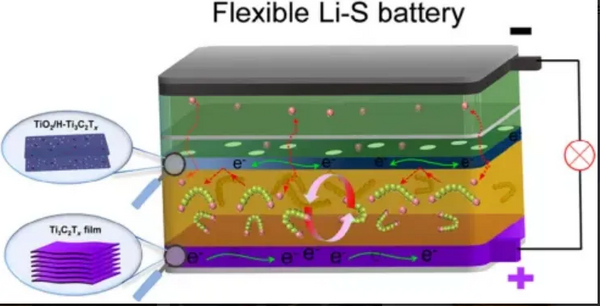The energy density of this cell is 210Wh/kg. If it is equipped with a high-energy non-metallic negative electrode, the energy density can reach 350Wh/kg.
According to the introduction of Horse Car Power Technology Co., Ltd., the sulfide all-solid-state battery still has a certain power output capacity at minus 40 degrees Celsius, and supports 10C fast charging, which can be fully charged within 6 minutes.
In order to dispel consumers' concerns about battery safety, Macar Technology demonstrated a battery cell disassembly test. When the cell is fully charged, the researchers used metal scissors to cut the cell casing, metal probes pierced the cell, and manually broke the pole pieces. The cell can still output power stably without explosion or fire. burning, etc.
Sulfide solid-state batteries have high safety because they do not use the lithium metal negative electrode of traditional batteries, and do not contain flammable substances such as liquid solvents, electrolytes, and additives.
In recent years, with the traditional batteries led by traditional ternary lithium, the problems of limited space for energy density improvement and insufficient safety have gradually been exposed, and the development of new energy vehicles has fallen into a bottleneck, which forced battery and vehicle companies to develop solid-state batteries one after another.
The sulfide system, with its better ionic conductivity and soft texture than traditional liquid electrolytes, makes it easier to form surface contact in solid-solid contact and supports high-voltage fast charging technology. It surpasses oxygenates and polymers in one fell swoop and becomes the most promising technical route for all-solid-state batteries.
Although sulfide solid-state batteries have many advantages, there are also sulfide electrolytes that easily react with water, oxygen, etc. in the air to generate harmful gases, which imposes high requirements on production and processing and increases manufacturing costs.
However, after years of research, the company has initially mastered the technological process, paving the way for mass production.
On July 19 this year, Honeycomb Energy successfully developed a 20Ah-class sulfur-based all-solid-state battery prototype cell with an energy density of 350-400Wh/kg, which is more than 30% higher than that of lithium electronic batteries.

The prototype of the cell also successfully passed the tests such as acupuncture and 200 degrees Celsius hot box, which proved the reliability of the product. Once mass-produced, it will become the norm for electric vehicles to exceed 1,000 kilometers of range.
In addition to Honeycomb Energy, the battery giant CATL is also actively developing and applying for patents in the manufacturing process.
Sulfide is not a scarce product. Compared with the current high price of 579,000 yuan per ton of battery-grade lithium carbonate (quoted on October 30), the cost will be lower after mass production, which is conducive to bulk purchases.
At the same time, since the solid-state battery has no separator and electrolyte, it can reduce the volume by about 40% and the weight by 25% compared with the lithium battery, which can play an advantage in space utilization and vehicle weight reduction.
According to the schedule provided by battery manufacturers, sulfide solid-state batteries are likely to enter the mass production stage in 2025. By then, the construction of supporting facilities for new energy vehicles will also be more complete. With the performance of over 1,000 kilometers of battery life, it can meet the needs of consumers for long distances. travel needs.
In the face of sulfide solid-state batteries, do you think it is the best solution for new energy electric vehicles?

